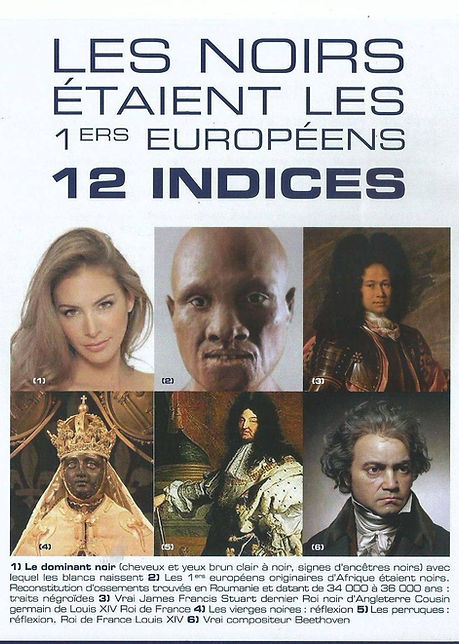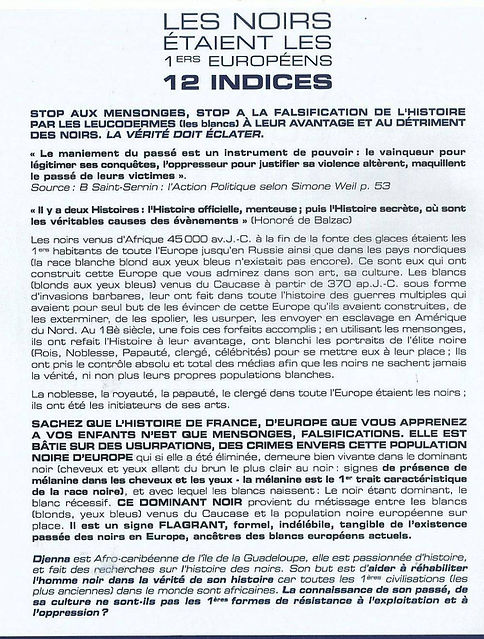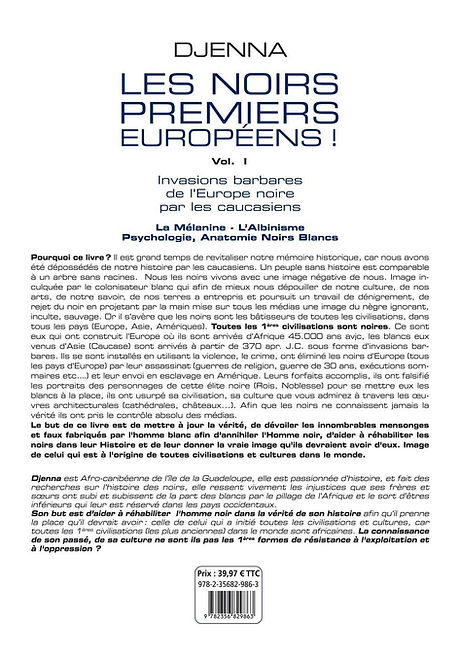EMPEREUR CHARLES V 1500/1558 Héritier des Habsbourg et de la maison de Bourgogne, Héritier de 17 couronnes


BEING BLACK, MELANIN THIS DIVINE BLESSING
www.la-melanine-une-benediction.com
SITE UNDER RENOVATION
info@la-melanine-une-benediction.com In Englishwww.melanin-a-blessing.com
ATTENTIONWE ARE ATTEMPTING TO BLOCK THIS SITE BY CALLING IT DANGEROUS. DISREGARD ANY WARNINGS, THIS SITE IS SAFE AND WELL PROTECTED with Kaspersky (the most reputable anti-virus). They do everything to prevent us from having access to our knowledge.STRONGLY RECOMMEND THIS SITE TO YOUR FRIENDS
The purpose of this site is to bring black people to self-awareness, to realize that with Africa cradle of humanity,(Africa)they are at the origin of all inventions: inventions -in all fields ofknowledge, as far back as one can trace- monopolized, copied and improved by the leucodermas who usurped them and declared themselves their inventors. Since High Antiquity, blacks have been the inventors of culture: arts, sciences, maths, philosophy, music, religion, engineering, medicine, surgery, astronomy, navigation etc... before whites stripped them of them and falsified them at their advantage. All science is related to Egypt which was a country populated by blacks.It is thanks to this black pigment present in abundance in their brain: neuromelanin,that black had and has this high capacity for creation, invention at all levels.
This site reveals the horrors and monstrosities put in place by the whites in order to degrade and reduce the blacks to the lowest level to justify their stripping, because the deficiency of the whites in this neuromelanin pigment did not allow them to equal the blacks. But neverthelessfor blacks, the purpose of this site is to be informed about them and their opponents: whites in order to be able get up and react, feel proud of themselves, grateful for their neuromelaninand their melanin, no longer allowing themselves to be reduced, degrading but having a win-win relationship in their relations with white people, no longer having this win-lose relationship which has always prevailed and continues to prevail ; the eternal winning the white, the eternal losing the black.Fueling resentment and anger towards them puts us in a losing position and has harmful effects on our health. We blacks must be diplomatic and lucidly seek our true interests in win-win relationships with leucodermas without bringing out resentment.
Isn't knowledge of one's past, of one's culture the first forms of resistance to exploitation and oppression?
Watch out, the wheel is turning, the West is in decline, the world is heading towards multipolarity. I'Africacontinent holding all the wealth of the planet, continent that does not know natural disasters,has its major role to play.Besides that our economic relations must be win-win with all our partners including Russia, China; before signing any partnership with any Western country (especially France), we must demand from them a written and signed commitment to reparations for all crimes (blood, looting, etc.) committed against us , because they have the blood of millions of Africans on their hands. We must also set up our own International Criminal Court to try all those Western criminals who abused us without mercy.We will be globally respected the day we command and inspire respect.
Dear visitors,see for yourself! : my videos are often deactivated, although very active on you tube, my visit counter had been removed (I put it back), as well as certain images. Would revealed truths bother?Recommend this site to those around you




Read the book ''Les Noirs 1ers Européens''
Sold by theTamery bookstorein Paris. General Library Guadeloupe The true history of blacks in Europe. 5th edition
" The manipulation of the past is an instrument of power: the winner to legitimize his conquests, the oppressor to justify his violence alter, disguise the past of their victims. Source: B Saint-Sernin: Political Action according to SimobornWeil pp53
-There are two Histories: the official, lying history that is taught; then the secret history, where are the true causes of the events: a shameful history "(Honoré de Balzac, writer)
We Blacks MUST KNOW that we have been victims since the 18th century by the leucodermas (the whites) of the most vast and monstrous impersonation of our kings, queens and famous people of Europe, that history has ever known. We are also victims of the greatest and diabolical falsification of history ever carried out. The leucodermas have done this diabolical work of make-up and crime with the help of their globally present secret societies.
Isn't knowledge of one's past, of one's culture the first forms of resistance to exploitation and oppression?
14 African countries forced by France to pay the colonial tax (the colonial debt) for the “benefits” of slavery and colonization
Idid you know? 14 African countries forced by France to pay the colonial tax (the colonial debt) for the “benefits” of slavery and colonization.
Indeed, many African countries after France granted them their independence were imposed - without their agreement - by the latter a colonial debt, contracted by the occupying power for the investments made in the occupied country, this debt was transferred to the new legally independent state.
Did you know ? Even today, many African countries continue to pay a colonial tax in France, despite independence!
When Sékou Touré first president of the Republic of Guinea, decided in 1958 to leave the French colonial empire, and then opted for the independence of the country, the French colonial elite in Paris s He was indignant, and in an act of historic fury, demanded that his administration then in place in Guinea destroy, throughout the country, what represented, in their eyes, the advantages of French colonization. Three thousand French people left the country, taking all their possessions and destroying everything that could not be moved: schools, nurseries, public administration buildings were destroyed, cars, books, medicines, the research institute, tractors were run over and sabotaged; horses, cows on farms were killed, and stored foods were burned or poisoned.
The purpose of this outrageous act was, of course, to send a clear message to all the other colonies about the consequences of France's rejection.
The fact is that little by little, fear took hold of the African Elites, and after these events no other country ever found the courage to follow the example of Sékou Touré, whose slogan was “We prefer freedom in poverty to opulence in slavery”.
For the newly independent countries, compromises had to be found with France. Sylvanus Olympio, the first president of the Republic of Togo, a small country in West Africa, came up with a solution that might calm the French:
Not wanting to continue to suffer French domination, he refused to sign the colonization pact proposed by De Gaulle, but agreed in return to pay an annual debt to France for the so-called advantages obtained during French colonization.
These were the only conditions for France not to destroy the country before leaving. However, the amount estimated by France was so large that the reimbursement of the so-called "colonial debt" was close to 40% of the country's budget in 1963.



From then on, the financial situation of newly independent Togo was very unstable, and in order to get out of this situation, Olympio decided to leave the monetary system set up by colonial France, the FCFA (franc of the French colonies in Africa), and created the country's currency.
On January 13, 1963, three days after he started printing the new banknotes, a squad of soldiers (supported by France) seized and killed the first elected president of independent Africa: Olympio was executed by a former French Legionnaire, army sergeant Etienne Gnassingbé who, by the way, received at that time a bonus of 612 dollars from the local French embassy for the success of his mission.
Olympio's dream was to build an independent and self-governing country. But the idea did not correspond to French wishes.
On June 30, 1962, Modiba Keita, the first president of the Republic of Mali, also decided to withdraw from the FCFA monetary system (imposed on 12 newly independent African countries).
Indeed, for the Malian president, who leaned more towards a socialist economy, it was clear that the colonization which continued with this pact with France, became a trap, a burden for the development of the country. He was overthrown in 1968 by a coup ordered from Paris.
On November 19, 1968, like Olympio, Keita was the victim of a coup led by another former French Foreign Legionnaire, Lieutenant Moussa Traoré.
In fact, during this turbulent period when Africa was fighting to free itself from the yoke of European colonization, France repeatedly used mercenaries formerly affiliated with the foreign legion to carry out operations against the newly elected presidents:
-
On January 1, 1966, Jean-Bedel Bokassa, a former French legionnaire, carried out a coup against David Dacko, the first president of the Central African Republic.
-
On January 3, 1966, Maurice Yaméogo, the first president of the Republic of Upper Volta, today called Burkina Faso, was the victim of a blow from Aboubacar Sangoulé Lamizana, a former French legionnaire who fought with French troops in Indonesia and Algeria against the independence of these countries.
-
On October 26, 1972 Mathieu Kérékou who was a security guard for President Hubert Maga, the first president of the Republic of Benin, carried out a coup against the president, after attending French military schools from 1968 to 1970.
-
Thomas Sankara was President of Burkina Faso from 1983 to 1987. The speech he made in Addis Ababa in 1987 proposed to renegotiate all the debt, deemed unfair, of African countries. He was assassinated a few months later, he was 37 years old. More than three decades later, it is still unknown who ordered or encouraged the assassination. He was an anti-imperialist, revolutionary, socialist statesman whose views disturbed the colonizing countries.
In fact, over the past 50 years, out of a total of 67 coups that have happened in 26 countries in Africa, 16 of these countries are former French colonies, which means that 61% of coups in Africa were initiated in former French colonies.
As these figures demonstrate, France is quite desperate, but active in maintaining a strong hold on its colonies no matter how, no matter the cost.
In March 2008, former French President Jacques Chirac said: "Without Africa, France will slide down into the rank of a third world country". The predecessor of Jacques Chirac François Mitterrand had already prophesied in 1957 that: “Without Africa, France will have no history in the 21st century”
As I write this article, 14 African countries are obliged by France, through the colonial pact, to put 85% of their reserves in the central bank of France under the control of the French Ministry of Finance. Until now, in 2014, Togo and about 13 other African countries still have to pay the colonial debt to la France. African leaders who refuse are killed or victims of coup. Those who obey are supported and rewarded by France with a lavish lifestyle, while their people endure misery and despair.
Such an evil system is denounced by the European Union, but France is not ready to do without this colonial system which offers it a treasury of approximately 500 billion dollars from Africa, and this by year.
We often accuse African leaders of corruption and serving the interests of Western nations, but there is a clear explanation for this behavior. They behave this way because they are afraid of being killed or of being the victim of a coup d'etat. They want to ally themselves with a powerful nation to safeguard themselves in the event of aggression or difficulties. But, unlike friendly protection, Western protection is often offered in exchange for renouncing to serve their own people or the interests of nations.
African leaders would work for the benefit of their people if they were not constantly harassed and intimidated by colonial countries.
In 1958, frightened by the consequences of his choice of independence from France, Léopold Sédar Senghor declared: "The choice of the Senegalese people is independence, they want it to take place only in friendship with France, not in dispute. “
From then on, France only accepted “independence on paper” for its colonies, but signed “cooperation agreements” in parallel, specifying the nature of their relations with France, in particular their ties to the currency. (the Franc), the French education system, military agreements and trade preferences.

